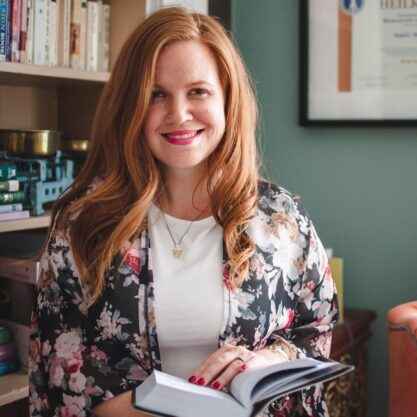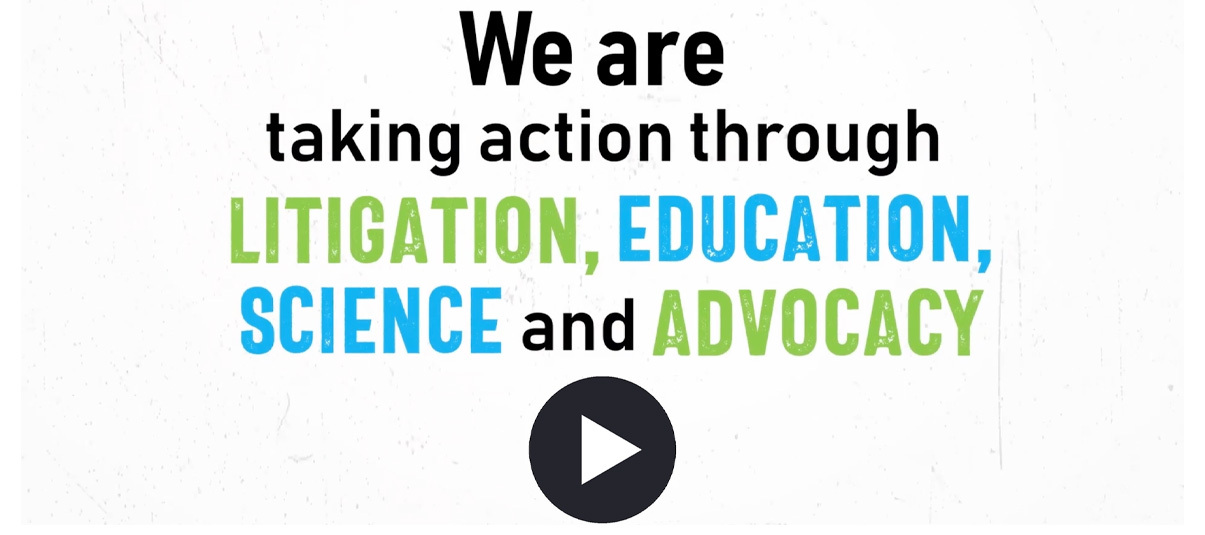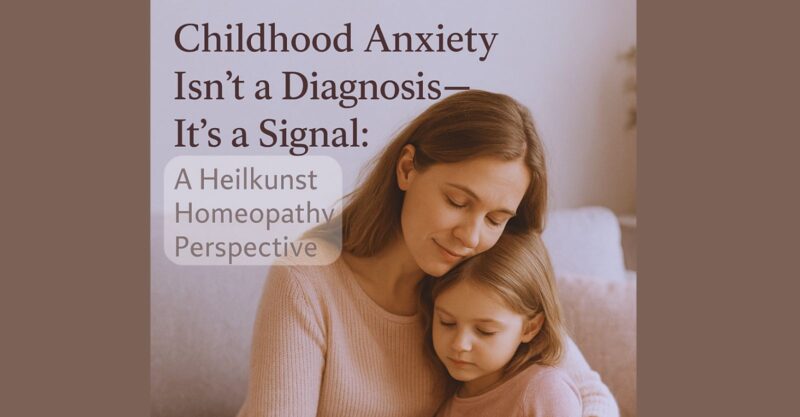Childhood Anxiety Isn’t a Diagnosis—It’s a Signal: A Heilkunst Homeopathy Perspective
By Natalie Friese ND, HD, DMH
and Amanda Lamb DMH
Childhood anxiety is rising at unprecedented rates. Conditions like generalized anxiety disorder, OCD, social phobia, panic attacks, and other fear-based diagnoses are becoming the norm. But what if anxiety isn’t a diagnosis at all? What if it’s a signal—a message from your child’s inner world that something deeper needs to be addressed?
Why Today’s Children Are Struggling
Children today are being raised in a world that’s emotionally stunted, overly structured, and mechanized. They’re pushed to fit into boxes that don’t allow for creativity, rest, or authentic self-expression. They’re asked to navigate complex social and psychological pressures that far exceed their developmental readiness.
“According to Rudolf Steiner, play is not just a pastime—it is essential for the
healthy development of the child’s physical, emotional, and spiritual being.”
When fear penetrates the soul, it disconnects children from their innate joy and freedom. They retreat into reactive, defensive, and protective behaviors, rather than engaging curiously and openly with the world around them. This disconnection disrupts natural play, severs ties to their higher self, and interferes with healthy developmental rhythms.
The Loss of Free Play and Connection to Nature
Steiner warned against the increasing abstraction and mechanization of modern life. Screens, artificial light, overstimulation, and over-scheduling pull children away from the grounding rhythms of nature and free play—two elements vital for emotional resilience and self-regulation.
Modern parenting and education systems often involve over-control and excessive structure—all in the name of safety and performance. But this leaves little room for the child’s inner will, imagination, and emotional expression to develop. Without these soul-nourishing experiences, anxiety takes root.
💬 A Practitioner’s Perspective
“In my practice, I’ve worked with many children who thrive when supported with remedies and approaches that nurture their healthy personalities—rather than pathologizing everything as a ‘symptom.’ I help parents discover strategies, grounded in natural law, to guide their children toward self-understanding and self-love as they move through a society that often feels like a closed box. Today’s children are being asked to face complex social and psychological pressures far beyond their developmental readiness—and they need extraordinary remedies to meet the demands of this extraordinary world.
— Natalie Friese, Naturopath & Doctor of Medical Heilkunst
🌿 A Personal Reflection
Heilkunst reshaped how I wanted to parent—well before she was born—away from the patterns I was raised with and toward something more conscious and honoring of who my daughter truly is. Supporting her with gentle homeopathic remedies and giving her the freedom to learn in her own rhythm has allowed her to discover her strengths, interests, and challenges in a way that feels deeply authentic. She gets to try, fail, reflect, and grow—with me beside her, not controlling, choosing, or judging but supporting her. Our bond is grounded in love, trust, and mutual respect. Remedies support her physically—like when she broke her ankle—and emotionally, like through the grief of losing her first pet. Raising Lily through the tenets of Heilkunst is helping her meet the world whole, and authentically herself.”
— Amanda Lamb, Heilkunst Parent & Practitioner
🔍 Understanding the Root Causes of Anxiety in Children
From a Heilkunst perspective, anxiety isn’t just a behavioral issue—it’s a signal of a deeper imbalance in the child’s life force. Here are three core areas we explore:
1. Emotional Inheritance & Early Influences
From the moment of conception, children are deeply connected to their parents—physically, emotionally, and energetically. When a parent carries unresolved fear, trauma, or stress, the child can often absorb these emotional imprints, which may begin shaping their emotional foundation long before they learn to speak. In addition to these early influences, children alsoinherit generational patterns—tendencies that may later manifest as fear, insecurity, or perfectionism. These are not character flaws, but deeply rooted emotional imprints passed down through generations. Often, these patterns remain dormant until they are triggered by stress or significant life events.
2. Adapting Instead of Becoming
As children grow and begin to develop their identities, they often adapt to the emotional dynamics within their families. For example, if a child senses that love or approval is given only when they are quiet, high-achieving, or helpful, they may begin to internalize those behaviours—even if they don’t align with their true selves. Over time, these adaptive patterns can become ingrained, gradually hardwiring anxiety into their developing self-concept.
3. The Schooling Environment
Whether in public, private, homeschool, or unschooling models, children can experience anxiety for different reasons:
- Public/Private School: often face constant performance pressure, social comparison, and rigid schedules. Many develop anxiety around tests, fitting in, or meeting adult expectations.
- Homeschooling: may have more emotional support and flexibility, but anxiety can still arise if family dynamics are unbalanced or if they experience social isolation.
- Unschooling: learn at their own pace, often face less performance-based anxiety, but they can still carry inherited or early emotional patterns if not addressed.
Regardless of the model, anxiety often stems from a disconnection from the child’s authentic self, shaped by inherited trauma and reinforced by environmental pressures.
🌿 Remedy Archetypes: Understanding Your Child’s Anxiety through Their Unique Nature
Each child expresses anxiety in a way that reflects their core nature—not just their symptoms. Below are some of the most common remedy pictures we see in anxious children, shared here as gentle portraits to help you recognize what may be going on beneath the surface.
Baryta Carbonica – The Timid Observer
Your child may come across as shy, timid, or hesitant—especially around new people or environments. They might cling to you more than others their age and resist stepping outside familiar routines. These children are often incredibly sweet and sensitive, but they hold back, worried about being judged or making mistakes. School or social situations can feel overwhelming, and they may struggle with confidence, memory, or feeling “behind.” What they really need is reassurance, time, and safe, consistent support as they slowly unfold.
Calcarea Carbonica – The Thoughtful Homebody
This is the cautious child who wants to understand the world before diving in. They may seem slow to warm up or rigid in their routines, but it’s because they feel safest when things are predictable. They might worry about their health or about bad things happening, and they’re especially sensitive to the expectations of adults. Often pale, prone to sweating (especially on the head), and easily chilled, these children do best when life moves at a steady, comforting pace. They’re deeply responsible, and benefit from encouragement and reassurance without pressure.
Lac Maternum – The Sensitive Soul
Your child may seem conflicted—craving closeness but resisting it at the same time. They often carry a deep fear of separation or abandonment and may struggle with transitions (like starting school or staying with a babysitter). Their emotions are layered, and they may swing between joy, irritation, and withdrawal. These children can appear dreamy, distracted, or even spaced out. They long to be nurtured and protected, but on their own terms. What they need is gentle, heart-centered connection and a feeling that it’s safe to let go.
Ignatia Amara – The Teary Storm
This is the child who holds their feelings deep inside. They may have experienced a shock—such as a loss, trauma, or big life change—and now show signs of grief-anxiety, mood swings, or dramatic outbursts. They often resist comfort, even though they desperately want to be understood. You might notice deep sighing, a lump in the throat, or emotional contradictions (laughing, then crying). These are emotionally intense children, needing space to process rather than pressure to be “okay.”
Gelsemium – The Frozen Performer
This child is bright and capable—but freezes when faced with pressure. Whether it’s speaking in class, performing in front of others, or going to an event, they may become shaky, tired, or mentally blank. They fear being judged or failing publicly. At home, they might seem relaxed, but the moment expectations rise, they withdraw. These kids need calm, low-pressure environments and gentle support that rebuilds their inner confidence.
Pulsatilla – The Tender Heart
Your child may be deeply affectionate, tender, and emotionally expressive—but also easily wounded. They may cry often, want to be near you constantly, or worry about being left out or unloved. At times, they can seem moody or indecisive, shifting like the wind. These children thrive with warm reassurance, comfort, affection, and a strong sense of connection. They’re empathetic, loving, and just want to know that they’re safe and seen.
Is Your Child Anxious, or Misunderstood? How Heilkunst can help.
We didn’t choose these particular remedies because they’re the most common—but because they represent emotional states that are often misunderstood or mislabeled as personality flaws. In truth, each child is entirely unique, and their healing approach should be too. Many parents sense this intuitively. They know something deeper is going on beneath their child’s anxiety, and they feel—often strongly—that medication isn’t the only, or even the best, answer.
Heilkunst offers a compassionate and individualized way to uncover what’s truly going on—beneath the behaviors, beneath the labels—and gently support your child back to wholeness.
There are many gentle, natural remedies that can help an anxious child feel safe in their own skin again—where they can breathe more deeply, trust more fully, and play their little hearts out.
Heilkunst homeopathy doesn’t pathologize your child—it meets them. It doesn’t suppress their light—it helps restore it.
But supporting a child’s anxiety often means healing the system they’re part of. That’s why we so often encourage parents to receive treatment as well. When we shift out of fear, guilt, and overwhelm—and into clarity, groundedness, and leadership—something remarkable happens.Our children don’t need us to be perfect. They need us to be rooted. To stand steady, so they can soften.
The remedies shared here aren’t just quick fixes. They’re outside-the-box solutions for going that deep—into the soul patterns, emotional imprints, and inherited dynamics that shape your child’s experience of the world. This is where real healing happens.
About the authors:
 Natalie Friese is a Naturopath and Doctor of Medical Heilkunst, and the founder of The Dynamis Institute. With deep reverence for the healing journey, she supports sovereign women, mothers, and families in reclaiming their health, vitality, and inner clarity through a complete system of natural medicine, classical homeopathy, and mind-body mentorship. Natalie works virtually with clients around the world, guiding them to dissolve fear, unravel inherited patterns, and reconnect with their innate creative power—so they can live, parent, and serve from a place of wholeness and truth.
Natalie Friese is a Naturopath and Doctor of Medical Heilkunst, and the founder of The Dynamis Institute. With deep reverence for the healing journey, she supports sovereign women, mothers, and families in reclaiming their health, vitality, and inner clarity through a complete system of natural medicine, classical homeopathy, and mind-body mentorship. Natalie works virtually with clients around the world, guiding them to dissolve fear, unravel inherited patterns, and reconnect with their innate creative power—so they can live, parent, and serve from a place of wholeness and truth.

Amanda Lamb is a Doctor of Medical Heilkunst who supports families in becoming their healthiest, most authentic selves. When possible, she works with parents first, recognizing that their own healing creates a strong foundation for the entire family. Her approach is grounded, compassionate, and holistic, using the principles of Heilkunst to treat both physical and emotional imbalances at their root. Amanda offers online consultations at Your Custom Life Map.
References: Clarke, John Henry. A Dictionary of Practical Materia Medica. 3 vols. London: Homoeopathic Publishing Company, 1900–1902. Bailey, P. M. (1995). Homeopathic Psychology: Personality Profiles of the Major Constitutional Remedies. Berkeley, CA: North Atlantic Books. Herscu, P. (1991). The Homeopathic Treatment of Children: Pediatric Constitutional Types. Berkeley, CA: North Atlantic Books. Steiner, R. (1996). The Education of the Child in the Light of Anthroposophy. Great Barrington, MA: Anthroposophic Press. (Original work published 1909) Available online via the Rudolf Steiner Archive: rsarchive.org
*********************************************************************************************************

